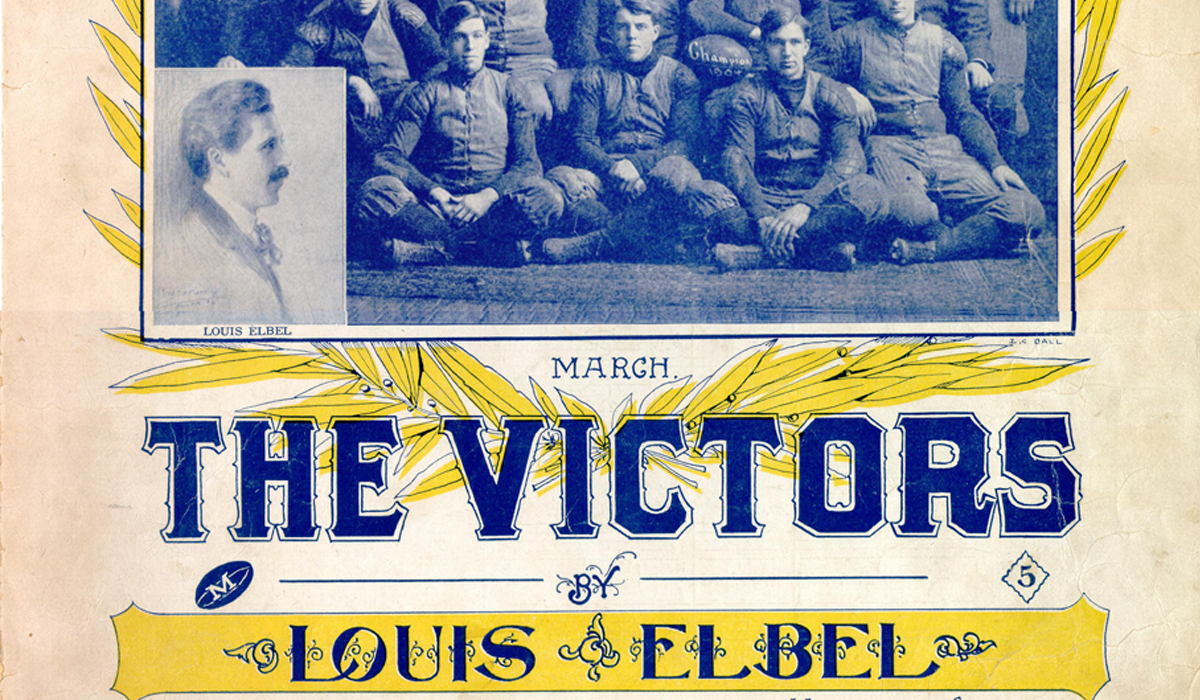I was washing my hands to my favorite 20-second song, “The Victors,” when I started to think: “Why are we the Champions of the West and not the Midwest?”
Since I talk to myself aloud these days, my husband overheard.
“That’s easy,” he said. “In 1817, we were about as far west as we could be.”
“But the song,” I retorted (after looking it up), “was written in 1898, when there were plenty of states west of us.”
So why, I still wondered, were we singing that we were the Champions of the West?
“In the football world of the 1890s on to 1920, ‘the East’ consisted of Ivy League institutions like Yale, Harvard, Princeton, the University of Pennsylvania, Cornell, and a few other schools,” reports Greg Kinney, MA’87, MALS’87, athletics archivist for the U-M Bentley Historical Library. “‘The West’ was everything else. As early as 1880, Michigan teams and students had talked of challenging the eastern schools and showing that western football was the equal of that played by the Ivies.”
The Big Ten Conference was founded in 1895 and was originally known as the Western Conference, with Michigan, the University of Chicago, Purdue, Northwestern, Illinois, Wisconsin, and Minnesota as members. “But before the Big Ten officially formed, teams claimed the unofficial title Champion of the West based on their team record,” says Kinney. “In the late 1880s to early 1890s, the winner of the Thanksgiving Day, Chicago-Michigan game was often proclaimed the Champion of the West.”
A thrilling victory in the 1898 Thanksgiving Day game gave the Wolverines their first Western Conference football title. Inspired by the event, Louis Elbel, a junior studying classical piano in what was then named the University School of Music, wrote “The Victors.” Using the standard construction of a military march, Elbel finished the tune on the train ride back to Ann Arbor.
He directed a student orchestra performance of “The Victors” in April 1899. A few days later, John Philip Sousa and his band gave the first public performance in Ann Arbor.
In his book “Natural Enemies: Major College Football’s Oldest, Fiercest Rivalry — Michigan vs. Notre Dame,” John Kryk tells the story of the Michigan-Notre Dame rivalry, not only for game wins but for fight songs. While researching, Kryk discovered alternate lyrics in the U-M athletic files of the 1920s.
Hail! to our Alma Mater!
Hail to dear old Ann Arbor!
Hail! Hail to Michigan
The Athens of the best!
This version makes no mention of the West or Midwest. No matter.
The song made its way far beyond the Midwest. President Gerald Ford, ’35, HLLD’74, often had the Naval Band perform his alma mater’s fight song instead of “Hail to the Chief.” French and German military bands played “The Victors” during World War I. The military band has played it at Buckingham Palace during the changing of the guard. The Michigan Symphony Band played it in 31 countries during a 1961 world tour. Now it is serving as a public health tool, with alumni throughout the world washing their hands to the length of the tune to ward off COVID-19 germs with soap and water.
Davi Napoleon, ’66, MA’68, would like to thank Cinda Nofziger, MS’15, lead archivist for Academic Programs and Outreach at the U-M Bentley Historical Library, for her help when libraries were closed.
Credit: 1904 sheet music cover courtesy of the U-M Bentley Historical Library.





